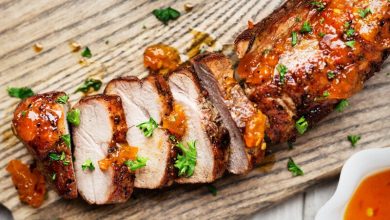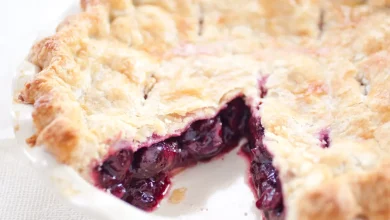🏆 Award Winning Rib Rub Ribs 🍖
Award Winning Rib Rub Ribs is a delicious and highly-praised barbecue recipe known for its mouthwatering flavors and tenderness. This rib rub recipe has gained recognition and awards in various barbecue competitions. Here’s a detailed overview of this delectable dish:
📜 History:
The history of Award Winning Rib Rub Ribs is deeply rooted in the American barbecue tradition. Barbecue competitions and cook-offs have been popular for decades, with pitmasters and home cooks constantly experimenting with rubs and techniques to create the perfect ribs. Over time, some cooks have developed recipes that stand out from the rest and have been awarded for their excellence. While there isn’t one specific origin, these award-winning ribs have become a staple in the barbecue world.
🌟 Components:
The key components of Award Winning Rib Rub Ribs include:
- Pork Ribs: Typically, spare ribs or baby back ribs are used for this recipe.
- Rib Rub: A special blend of spices and herbs that imparts flavor and forms a tasty crust on the ribs. The specific ingredients in the rub may vary, but commonly include paprika, brown sugar, salt, black pepper, garlic powder, onion powder, cayenne pepper, and other seasonings.
- Barbecue Sauce: Many variations of the recipe incorporate a flavorful barbecue sauce, which can range from sweet and tangy to smoky and spicy.
👩🍳 Preparation:
Here’s a general step-by-step guide on how to prepare Award Winning Rib Rub Ribs:
-
Prepare the Ribs:
- Start by removing the membrane from the back of the ribs if it’s still intact. This will help the rub penetrate the meat better.
-
Apply the Rib Rub:
- Generously coat the ribs on both sides with the rib rub mixture. Make sure to rub it in, ensuring the ribs are evenly seasoned.
-
Marination:
- Allow the seasoned ribs to marinate for at least 2-4 hours or even overnight in the refrigerator. This will give the flavors time to infuse into the meat.
-
Prepare the Grill/Smoker:
- Set up your grill or smoker for indirect heat cooking. Aim for a temperature of around 225-250°F (107-121°C).
-
Slow Cooking:
- Place the ribs on the grill away from direct heat. Use wood chips or chunks for added smokiness. Slow-cook the ribs for 3-5 hours, depending on the thickness of the ribs.
-
Baste with Sauce:
- If using barbecue sauce, baste the ribs during the last 30 minutes of cooking. This will caramelize the sauce and add a delicious glaze.
-
Rest and Serve:
- Let the ribs rest for a few minutes after cooking. This allows the juices to redistribute. Then, slice the ribs between the bones and serve with your favorite sides.
⏰ Time Needed:
The total time required to prepare Award Winning Rib Rub Ribs may vary depending on the size and thickness of the ribs, as well as your chosen cooking method. On average, it takes about 4 to 6 hours to make these ribs. The marination time can add a few hours to the process, so plan ahead for a delicious barbecue experience!
🍽️ These ribs are a crowd-pleaser and perfect for any barbecue or gathering. Enjoy the tender, flavorful, and award-worthy taste of these ribs with your friends and family! 🏆🍖😋
🍽️ Nutrition Facts and Health Information for Award Winning Rib Rub Ribs 🏆🍖
It’s important to note that while Award Winning Rib Rub Ribs are undeniably delicious, they are not known for being the healthiest option due to their high fat and calorie content. Here are some nutrition facts and health information to keep in mind when enjoying these mouthwatering ribs:
🔍 Nutrition Facts (Per Serving, Approximate):
- Calories: A serving of rib rub ribs can contain around 300-350 calories, but this can vary based on serving size and preparation method.
- Protein: You can expect 15-20 grams of protein per serving, making it a decent source of this macronutrient.
- Fats: Ribs are relatively high in fat, with approximately 20-25 grams per serving. Saturated fats are a significant component.
- Carbohydrates: These are quite low in carbs, with only a few grams per serving.
- Sodium: The sodium content can be significant, primarily due to the rub and barbecue sauce. A serving can have around 600-800 milligrams of sodium.
🚫 Health Information:
- High in Saturated Fat: The high fat content in rib rub ribs, especially saturated fats, can contribute to unhealthy cholesterol levels and heart issues if consumed in excess.
- Calorie-Dense: Ribs are calorie-dense, meaning they can contribute to weight gain if not consumed in moderation.
- Sodium Content: The sodium content in ribs can be quite high. Excessive sodium intake can lead to high blood pressure, heart disease, and other health concerns.
- Low in Nutrients: Ribs are low in essential vitamins and minerals. While they provide protein, they lack the variety of nutrients found in healthier food options.
🍽️ Healthy Eating Tips:
- Moderation: Enjoy rib rub ribs in moderation as an occasional treat, not as a regular part of your diet.
- Balanced Meal: If you choose to indulge in ribs, balance your meal with plenty of vegetables and lighter sides to enhance its nutritional profile.
- Homemade Sauces: Consider making your own barbecue sauce to control the ingredients and reduce sugar and sodium content.
- Leaner Cuts: Opt for leaner cuts of ribs or trim excess fat when preparing them.
Remember, while it’s perfectly fine to enjoy indulgent foods like Award Winning Rib Rub Ribs on occasion, it’s essential to maintain a balanced diet and be mindful of your overall health and nutrition.👍🥗🍖




